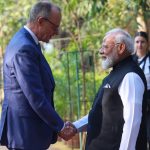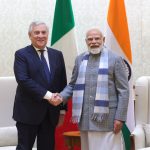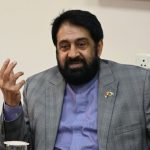
The Reluctant Fundamentalist
Author: Mohsin Hamid
Publisher: Penguin/Viking
Price: Rs 295

Mohsin Hamid’s The Reluctant Fundamentalist is an incisive portrait of the transformation of a Princeton-educated Pakistani youth with a cushy job in the Big Apple and an American girlfriend into an America-baiting radical with a sneaking sympathy for the 9/11 attackers. The novel astutely dramatises simultaneous schizophrenia and romance with the American dream many educated Muslim youths experience as they go about making existential choices in a world caught in the treacherous currents of East-West encounters.
The narrative is cunningly constructed as a monologue of Changez, a Pakistani 20-something young man who lands up a plum job in New York and falls in love with the beautiful but troubled Erica (a subtle pun on Am-Erica), with an unidentified American as his sole listener in a restaurant in the famous Old Anarkali Bazaar in Lahore.
This is, however, just a framing device. The Pakistani author’s second novel has a more ambitious and apt theme as it digs deeper into the psychology of fundamentalism and the roots of Muslim anger against an arrogant and meddlesome America without being shrill or loud.
The bright and beautiful American dream turns sour for Changez one fine day in Manila where he had gone to value an ailing company for Underwood Samson, an elite firm that proudly flaunts “Focus on the fundamentals” as its motto – an ironic reference to capitalist fundamentalism as opposed to the one of Islamic variety.
As he switches on TV on that scarring day in contemporary world history – September 11, 2001 – he finds to his surprise that instead of being repelled by terror attacks on the World Trade Centre, he appeared “remarkably pleased.
”
“But as I continued to watch, I realised that it was not fiction but news. I stared as one – and then the other – of the twin towers of New York’s World Trade Centre collapsed. And then I smiled. Yes, despicable as it may sound, my initial reaction was to be remarkably pleased,” says Changez, his inner voice articulating cultural conflicts he had chosen to gloss over in the midst of the good things of life Manhattan offered.
This was Changez’s moment of conversion; and from this point onwards his self-deprecating voice, alternatively wry and witty, acquires an edge of touchiness and anguish.
Another moment of conversion in Changez’s life occurs in Valparaiso where he had gone to evaluate an old publishing company targeted for a takeover. Over lunch, the publisher, in an oblique hint at his predicament, tells him the story of janissaries of the Ottoman empire, who were captured Christian boys trained to fight against their own people, which they willingly did with singular ferocity.
“I was a modern-day janissary, a servant of the American empire at a time when it was invading a country with a kinship to mine …” observes Changez in a biting moment of self-knowledge.
American neo-imperialist maneuvers and pretensions come in for a sharp critique in the pitilessly satirical voice of the narrator. “Armed sentries manned the check post at which I sought entry; being of a suspect race I was quarantined and subjected to additional inspection,” muses Changez as he mentally prepares to give up everything American he loved till the other day, in an ironic twist, for the seductions of rooting for one’s besieged country and religion.
First gently mocking, his anti-Americanism soon hardens into a conviction that such an America had to be stopped, echoing dark thoughts of an al-Qaeda radical.
“As a society, you were unwilling to reflect upon the shared pain that united you with those who attacked you. You retreated into myths of your own difference, assumptions of your own superiority.”
“And you acted out these beliefs on the stage of the world, so that the entire planet was rocked by the repercussions of your own tantrums, not least my family, now facing war thousands of miles away. Such an America had to be stopped in the interests not only of the rest of humanity, but also in your own,” says the narrator.
Hamid’s second novel is thus part fiction, part history and part polemics that is firmly grounded in bruising realities of the post-9/11 world, caught in a conflict between alternate value systems of Islam and the West.
It also illuminates the temptations of radicalism and fundamentalism for well-heeled, educated youth who for all their success in the West still feel a sense of deep alienation and ennui in their adopted homelands. This was true of the profile of the key perpetrators of 9/11 attacks and, more recently, of the suspects in the failed UK terror plot.
Not that the fundamentalists have a morally superior alternative in place. After harrowing self-introspection, Changez goes back home, albeit reluctantly, and turns a lecturer at a local college who loves nothing more than exposing the manner in which America conducts itself in the world.
“I had always resented the manner in which America conducted itself in the world; your country’s constant interference in the affairs of others was insufferable. Vietnam, Korea, the straits of Taiwan, the Middle East and now Afghanistan: in each of the major conflicts and standoffs that ringed my mother continent of Asia, America played a central role,” Changez tells his American interlocutor who never speaks a word, making the novel a sustained monologue.
Towards the end, the narrator mocks at his own paranoia and that of his American interlocutor, illuminating ironies of mutual prejudice and misperception. “It seems an obvious thing to say but you should not imagine that we Pakistanis are all potential terrorists, just as we should imagine that you Americans are all undercover assassins,” the narrator tells his American listener.
It is in these troubled and self-conscious soliloquies one can find insights into the misguided clash of civilisations that is being enacted by fanatics on both sides of the divide.
Author Profile

- Manish Chand is Founder and Editor-in-Chief of India Writes Network (www.indiawrites.org) and India and World, a pioneering magazine focused on international affairs. He is CEO, Centre for Global India Insights, an India-based think tank focused on global affairs.
Latest entries
 India and the WorldJanuary 13, 2026India, Germany raise the bar for defence, economic ties
India and the WorldJanuary 13, 2026India, Germany raise the bar for defence, economic ties India and the WorldDecember 12, 2025India-Italy bonding: Tajani’s visit raises the bar for business, maritime ties
India and the WorldDecember 12, 2025India-Italy bonding: Tajani’s visit raises the bar for business, maritime ties In ConversationNovember 26, 2025G20 is a Force for global Good
In ConversationNovember 26, 2025G20 is a Force for global Good articlesNovember 26, 2025Rescuing G20 from North-South divide: Ubuntu Moment
articlesNovember 26, 2025Rescuing G20 from North-South divide: Ubuntu Moment







